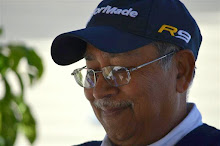A Song Before the Gunfire
*A Cherished Unfinished Memory*
Whenever I meet someone new, I prefer to watch from a distance before approaching. If the person seems easygoing—smiling, perhaps with a book in hand—I take it as a sign from fate that a good conversation awaits. For a storyteller, life is an infinite anthology, and strangers are just unwritten pages.
I still remember my early days at the Gauhati Refinery of Indian Oil Corporation. Back then, there was no direct broad-gauge line to Gauhati. The route took you from Delhi to Barauni by broad gauge, and then onward by meter gauge to Gauhati. Today’s seamless rail connections are faster, but they lack the gentle rhythm of those journeys, the leisurely stations, and—most of all—the companionship of shared travel.
In those first-class compartments, often two of the four berths were taken by army officers. It was 1965, and Assam, bordering East Pakistan, had a strong military presence. The Assam Mail seemed half train, half khaki-clad convoy—officers on transfer, soldiers returning from leave, and young recruits with duffel bags full of hope and apprehension.
One journey stands out vividly. I was placed in a two-berth coupé alongside a young army officer, Lieutenant Anand. He was barely past twenty-three, bright-eyed, and brimming with mischief. Within minutes of settling in, he pulled from his wallet a well-handled photograph—a young woman smiling with both shyness and affection.
“Her name’s Meera,” he said warmly. “She still calls me ‘Anu.’ Military enough for the kitchen, but not for the parade ground.”
I smiled. “Nicknames are medals of the heart. Far more precious than the ones issued officially.”
Over dinner—chicken, chapatis, and a pudding of uncertain color—Anand produced a bottle of Old Tavern rum. “Officer’s ration,” he announced with mock ceremony. “For high morale in low spirits.”
He then spoke of Meera—how they met at Delhi University, how she loved romantic songs, especially the haunting melody Kishore Kumar had sung in *Mr. X in Bombay* the year before: *“Mere Mehboob Qayamat Hogi…”* He said it was “their” song, playful yet tinged with longing.
As he spoke, a memory flitted across my mind—a story from the Delhi newspapers in 1964. An army officer had shot his girlfriend in a café after a breakup. The café’s jukebox had been playing *“Mere Mehboob Qayamat Hogi”* when it happened. That detail had haunted me ever since—the cruel dissonance between a song’s tender yearning and the violence that followed it.
Listening to Anand, I found myself silently praying that his tale would not echo that tragedy. His laughter was bright, but that memory reminded me how easily love can turn fragile under the weight of absence and fear.
“You’re thinking like a writer again, aren’t you?” he asked, noticing my quietness.
“Perhaps,” I admitted. “Writers can’t help seeing storms in calm waters.”
He lifted his glass with a grin. “Then let’s drink before the rain begins.”
By morning, Gauhati appeared through mist and drizzle. On the platform, Anand adjusted his cap, shook my hand, and said, “If you ever write about me, make me sound brave—but human.”
“That’s the only kind I know how to write,” I replied.
We parted as travelers often do—with an unspoken promise and a friendship destined to live only between stations.
When the War Came
Later that year, war arrived.
One evening at the refinery officers’ club, we were mid-game in badminton when the siren wailed. The shuttlecock froze midair as someone shouted, “Enemy aircraft!” The generators went off instantly, plunging the compound into darkness. Then the two anti-aircraft guns stationed on the hills beside the refinery roared to life.
Tracer shells streaked upward, weaving fiery paths across the night sky. The air shuddered with sound and courage. We dropped flat on the court as our guns kept firing. Moments later, Indian fighter jets thundered overhead, streaking through the clouds in pursuit of the intruders.
When silence finally returned, no one moved. The officers’ club lights stayed off, and the dark seemed to hum with memory. I lay staring at the stars, my mind turning to Lieutenant Anand—somewhere beyond those hills, perhaps crouched behind his own gun, maybe thinking of Meera and that photograph he carried.
And faintly, from the corners of remembrance, I could almost hear Kishore Kumar’s voice echoing: *“Mere Mehboob Qayamat Hogi…”*
War, I realized, doesn’t just destroy—it interrupts. It cuts short songs, conversations, dreams unfinished.
That night, as tracer smoke faded into silence, I sent a quiet wish into the sky for him—that his story would not end in gunfire, but continue softly, like a song still playing long after the jukebox has stopped.
And that is how I remember him—not just a soldier I once met on a train, but a note suspended between love and duty, somewhere in the melody of an unfinished memory.
---


5 comments:
You get better at this with every post you make.
Thanks dear for your appreciation!
Beautifully expressed...
Deeply moved… romance, love & shattering war.. beautifully penned Sir 🙏
Thanks dear Sabysachi for liking the blog !
Post a Comment